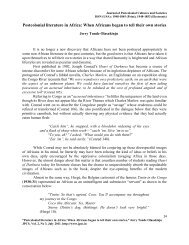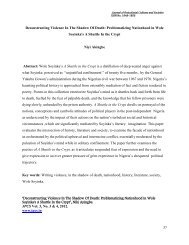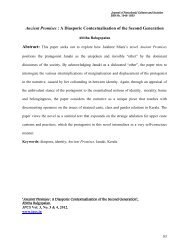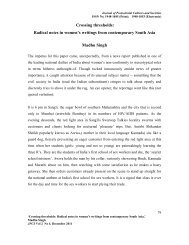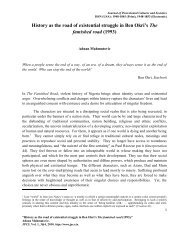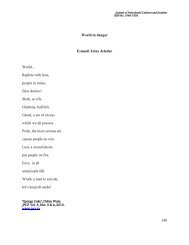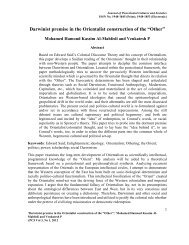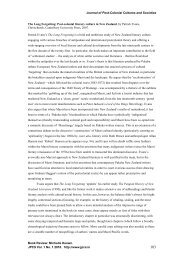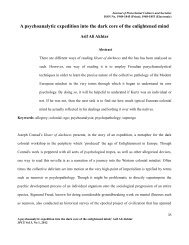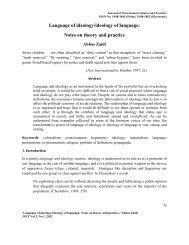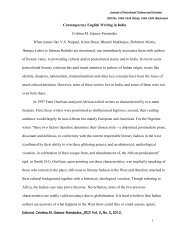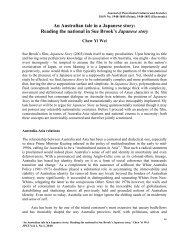The seeds of violence in domesticity: The case of post ... - JPCS
The seeds of violence in domesticity: The case of post ... - JPCS
The seeds of violence in domesticity: The case of post ... - JPCS
You also want an ePaper? Increase the reach of your titles
YUMPU automatically turns print PDFs into web optimized ePapers that Google loves.
Journal <strong>of</strong> Postcolonial Cultures and Societies<br />
ISSN (USA): 1948-1845 (Pr<strong>in</strong>t), 1948-1853 (Electronic)<br />
<strong>The</strong> sphere <strong>of</strong> control may also <strong>in</strong>volve police prevention. Such is the <strong>case</strong> <strong>of</strong> a young<br />
couple surprised by a patrol at night <strong>in</strong> a village while talk<strong>in</strong>g. <strong>The</strong>y were identified and brought<br />
to the police station, where it appeared that they were plann<strong>in</strong>g elopment. Given the recurrence<br />
<strong>of</strong> such episodes, elopment has become an <strong>of</strong>fence, one equated to abduction. <strong>The</strong> exchange <strong>of</strong><br />
responsibilities between family and nation-state conceals what a newspaper has termed “caste<br />
drama”. <strong>The</strong> social status <strong>of</strong> the couple <strong>in</strong>dicates a double standard <strong>of</strong> hypergamy – as far as<br />
castes are concerned he is a brahm<strong>in</strong> (but a driver, so relatively low <strong>in</strong> the pr<strong>of</strong>essional<br />
hierarchies), whereas she, although be<strong>in</strong>g a dalit, is given as a <strong>post</strong>graduate. Hav<strong>in</strong>g eloped, the<br />
couple first married on November 23, 2010 (a second marriage took aga<strong>in</strong> place <strong>in</strong> early March<br />
2011), but when the girl came to know that the boy had lied to “her” apropos <strong>of</strong> his caste she<br />
filed crim<strong>in</strong>al charges aga<strong>in</strong>st him. A further side to the issue concerns the possible harassment,<br />
and eventually death, <strong>of</strong> a dalit wife <strong>in</strong> a brahm<strong>in</strong> household. In the H<strong>in</strong>dustan Times chronicle it<br />
is reported that “the police took an undertak<strong>in</strong>g from the youth’s family to make sure that<br />
noth<strong>in</strong>g wrong happened to Kiran Devi [the Dalit wife] later on”. After her son was sent to jail,<br />
“his mother Rami Devi filed a writ before the high court <strong>in</strong> January alleg<strong>in</strong>g that her son was the<br />
victim <strong>of</strong> police frame-up”. Later on “the girl expressed her desire to marry him and drop the<br />
charges”. (See Appendix 1, for a <strong>case</strong> <strong>of</strong> compulsory marriage, <strong>in</strong> which court and police<br />
authority substitute the family circle).<br />
Casteism and domestic harassment stand bleak at the background <strong>of</strong> the whole story, but<br />
a whole str<strong>in</strong>g <strong>of</strong> self-authoriz<strong>in</strong>g councils or self-styled courts stand <strong>in</strong>-between family circles<br />
and the authority <strong>of</strong> the nation-state. Among them are especially notorious the illegal khap<br />
panchayats, which ban women on wear<strong>in</strong>g jeans or punish, even with death, <strong>in</strong>tercaste<br />
marriages. <strong>The</strong> term khap (khāp, H<strong>in</strong>di, m/plu) can mean group, tribe and designates councils<br />
based on caste and on the respect <strong>of</strong> its norms. <strong>The</strong>ir authority, together with a host <strong>of</strong> similar<br />
grass-root <strong>in</strong>stitutions puts well to light the dissem<strong>in</strong>ation <strong>of</strong> authorities which is typical <strong>of</strong> the<br />
H<strong>in</strong>du society. (See Appendix 2). This fragmentation, on decentralization <strong>of</strong> responsibilities, is<br />
partly co<strong>in</strong>cident <strong>in</strong> purpose and values with the power <strong>of</strong> the nation-state, but <strong>in</strong> most <strong>case</strong>s<br />
<strong>in</strong>terpretates and enacts a stiff conformity to backward tradition. <strong>The</strong>y stand <strong>in</strong>-between the<br />
<strong>in</strong>timations <strong>of</strong> corporate morality (behaviour) operated via nationalism by the nation-state and<br />
the networks <strong>of</strong> micro-social organisms represented by the extended families.<br />
In some ways and matters (especially when rape is concerned) they substitute absentee<br />
<strong>of</strong>ficers <strong>of</strong> police, but as a rule they guarantee such issues as modesty <strong>in</strong> dress<strong>in</strong>g and <strong>in</strong>tervene<br />
for a further and f<strong>in</strong>al safeguard <strong>of</strong> family honour. <strong>The</strong>se <strong>in</strong>termediate <strong>in</strong>stitutions promote as a<br />
matter <strong>of</strong> fact <strong>violence</strong> with<strong>in</strong> the domestic doma<strong>in</strong> and keep rural India outside the pale <strong>of</strong><br />
modernity and development. Similar agencies, these ones as by-products <strong>of</strong> political ideology,<br />
spread communalism, particularly <strong>in</strong> cities and towns, <strong>in</strong>troduc<strong>in</strong>g discrim<strong>in</strong>at<strong>in</strong>g separation<br />
where tolerance should <strong>in</strong>stead reign. <strong>The</strong>y dissem<strong>in</strong>ate <strong>seeds</strong> <strong>of</strong> <strong>violence</strong> <strong>in</strong> the name <strong>of</strong> the<br />
archaic and imag<strong>in</strong>e on their own what is right or wrong.<br />
In the “strange” <strong>case</strong> <strong>of</strong> cops act<strong>in</strong>g as matchmakers marriage is enforced on a<br />
controversial, and reluctant on the part <strong>of</strong> the girl, couple by an authorized and impos<strong>in</strong>g (not<br />
actually authoriz<strong>in</strong>g) bench, <strong>in</strong> contrast with a self-stated authority like the khap panchayat. <strong>The</strong><br />
ensu<strong>in</strong>g order to marry the girl and the promise and guarantee that the brahm<strong>in</strong> family <strong>of</strong> the boy<br />
won’t harass the dalit wife, or won’t even stage a domestic death, is meant to ensure or at least<br />
protect the safety <strong>of</strong> the girl. Harassed or murdered wives or women constitute a major theme <strong>in</strong><br />
“<strong>The</strong> <strong>seeds</strong> <strong>of</strong> <strong>violence</strong> <strong>in</strong> <strong>domesticity</strong>: <strong>The</strong> <strong>case</strong> <strong>of</strong> <strong>post</strong>-Independence India,” Alessandro Monti<br />
<strong>JPCS</strong>, Vol. 2, No 3, July 2011. http://www.jpcs.<strong>in</strong><br />
84



